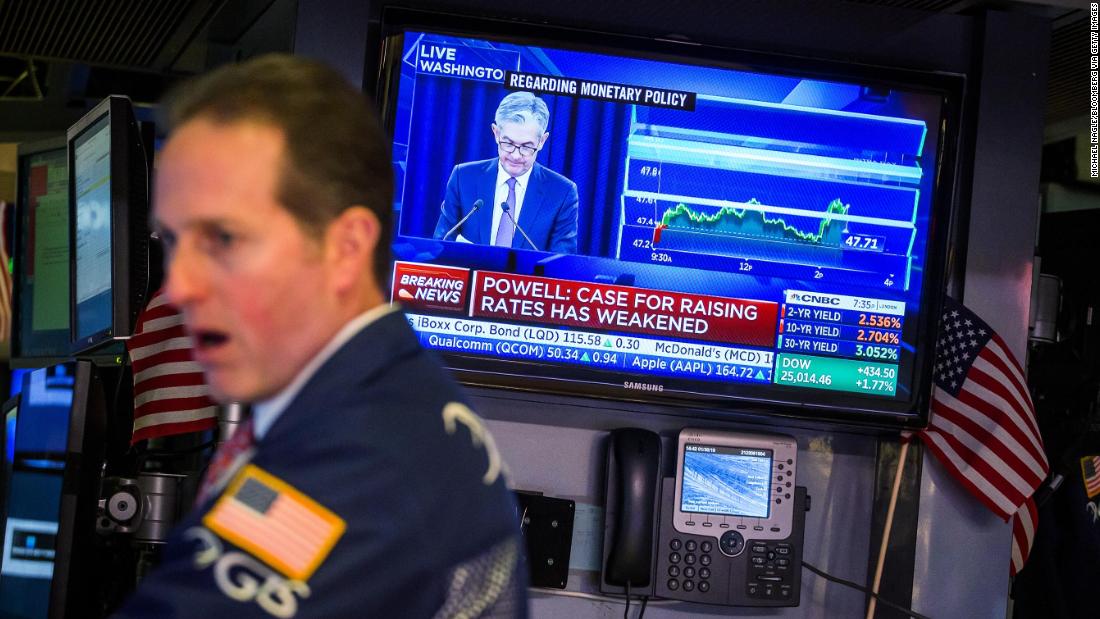
In mere weeks, the Fed went from signaling two interest rate increases in 2019 to suggesting it could be done with rate hikes altogether. Fed chief Jerome Powell went from saying the balance sheet is on "autopilot" to opening the door to adjusting the policy.
In effect, the Fed slammed on the brakes.
The speed and extent to which the Fed reversed itself is striking. The 180-degree turn led to immediate speculation that the central bank is surrendering to pressure from Wall Street. Recall that fears of an overly aggressive Federal Reserve helped send markets plummeting in November and December.
"It is difficult to read the outcome of the January FOMC meeting as anything other than the Fed capitulating to recent market volatility," Barclays chief US economist Michael Gapen wrote in a note to clients.
Charlie McElligott, cross-asset macro strategist at Nomura, said the Fed "utterly 'bent the knee' to the stock market."
"Equity prices now set policy I guess and not the other way," McElligott wrote to clients.
Not surprisingly, Wall Street liked what it heard. The S&P 500 rallied 1.6% on Wednesday, notching its first advance on a Fed decision day since Powell took the helm.
Worse, others worry the Fed is caving to Washington. Last year, President Donald Trump launched relentless attacks on Powell for raising rates too quickly. Rumors even swirled that Trump could do the unthinkable: fire Powell.
Trump cheered Wednesday's market rally, calling it "tremendous news!"
"For the first time I can recall, it appears that a sitting president has pressured a Federal Reserve Chairperson into an abrupt policy change," said Ian Winer, a former market strategist at Wedbush Securities who is now an advisory board member at Drexel Hamilton. "This precedent now brings into question the long-held assumption that the FOMC is independent of political whims."
Powell: Fed will 'never' take politics into account
Powell strongly denied the Fed is taking outside forces into consideration.
"Honestly, my only motivation is to do the right thing for the economy and the American people. This situation calls for patience," Powell told reporters on Thursday.
Asked if the Fed had "just caved" to the president's demands, Powell insisted that the central bank will "never" take political considerations into account -- or even discuss them.
"We're human. We make mistakes. But we're not going to make mistakes of character or integrity," Powell said.
Of course, there are legitimate economic reasons why the Fed is shifting course.
First, economic growth, especially overseas, is clearly slowing down. US GDP growth is expected to decelerate significantly in 2019. Italy's economy has stumbled into a recession. Germany's barely avoided one. And China is facing its most serious slowdown in a decade.
Secondly, inflation is not out of control. That likely gives the Fed the luxury of staying on the sidelines to see how the US economy responds to the global turmoil. The last thing the Fed wants to do is snuff out the second-longest economic expansion in American history by being inflexible.
'Oozed dovishness'
Still, some economists don't believe the fundamentals have deteriorated enough to justify the Fed's reversal. They argue that Wall Street was simply throwing a temper tantrum at the end of last year.
The official government jobs report isn't out yet, but ADP said the United States added a robust 213,000 private-sector jobs in January.
And Goldman Sachs is calling for GDP growth to rebound from 1.7% in the first quarter to 2.4% in the second quarter. That's hardly recession territory.
"The Fed's statement yesterday oozed dovishness, for no apparent reason," Ian Shepherdson, chief economists at Pantheon Macroeconomics, wrote to clients on Thursday. "What has changed?"
Importantly, the Fed statement removed a reference to "further gradual increases" in rates. Instead, the Fed pledged to be "patient" as it weighs "future adjustments."
By swapping "increases" with "adjustments," the Fed is implying that "the next move could be up or down," Gapen wrote.
Brilliant or dangerous?
Powell's patience could be a master stroke if inflation stays in check and growth slows significantly. By pausing, the Fed could engineer a soft landing for the American economy and keep the expansion alive.
But some fear that the Fed could be setting itself up for failure.
If the economy and inflation accelerate later in 2019, the Fed may have to aggressively raise interest rates to prevent overheating. That could set off another storm in financial markets, and perhaps the economy. (Not to mention the president's Twitter feed.)
"We worry that the Fed has traded near-term support for financial markets and the economy for another round of volatility later this year," Gapen wrote.
Shepherdson agrees because he expects the headwinds facing the economy to diminish soon.
"The risk of a policy mistake is rising," he wrote.
Great blog. All posts have something to learn. Your work is very good and i appreciate you and hopping for some more informative posts. Best pet relocation services in bahrain
ReplyDelete